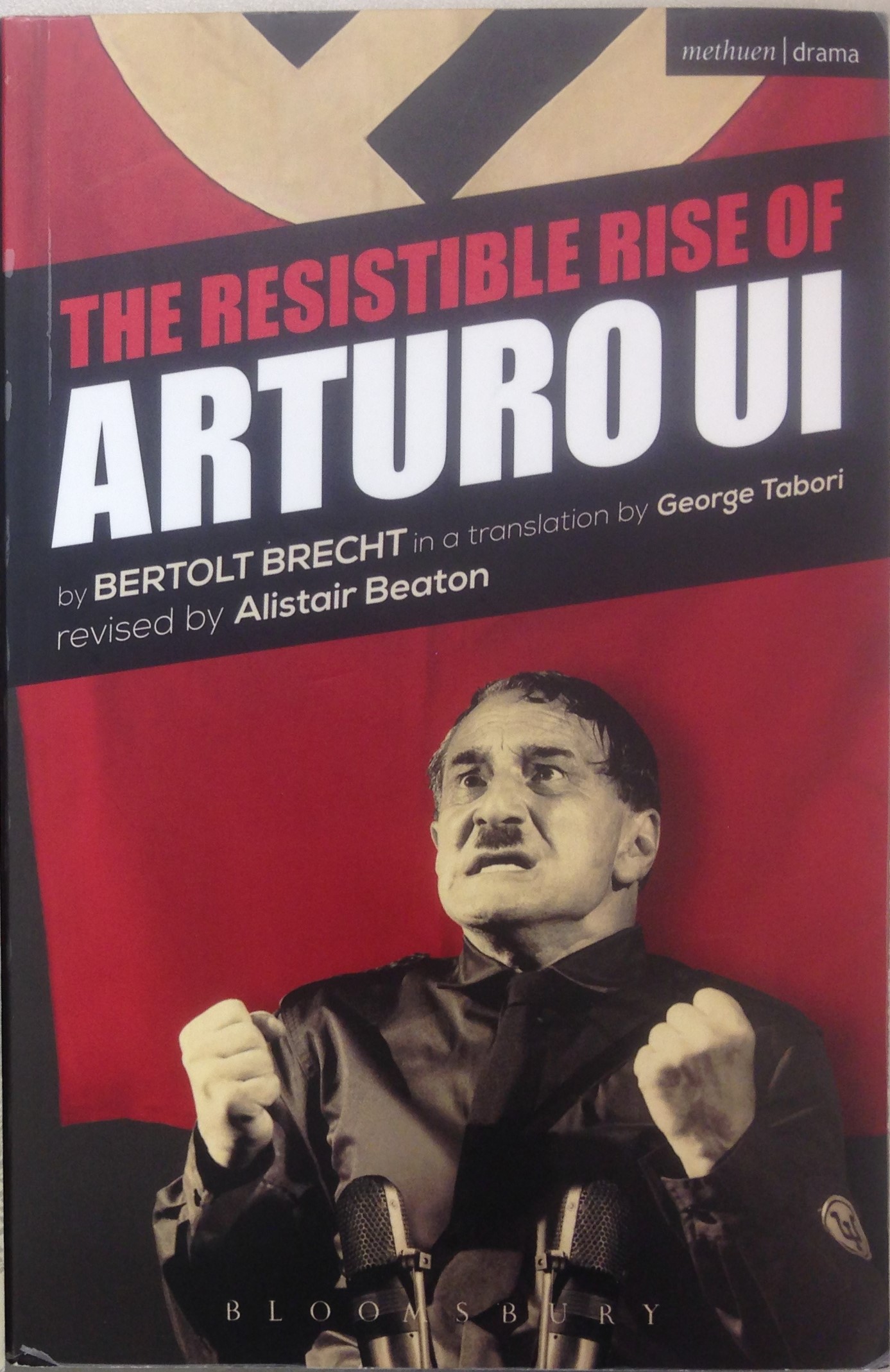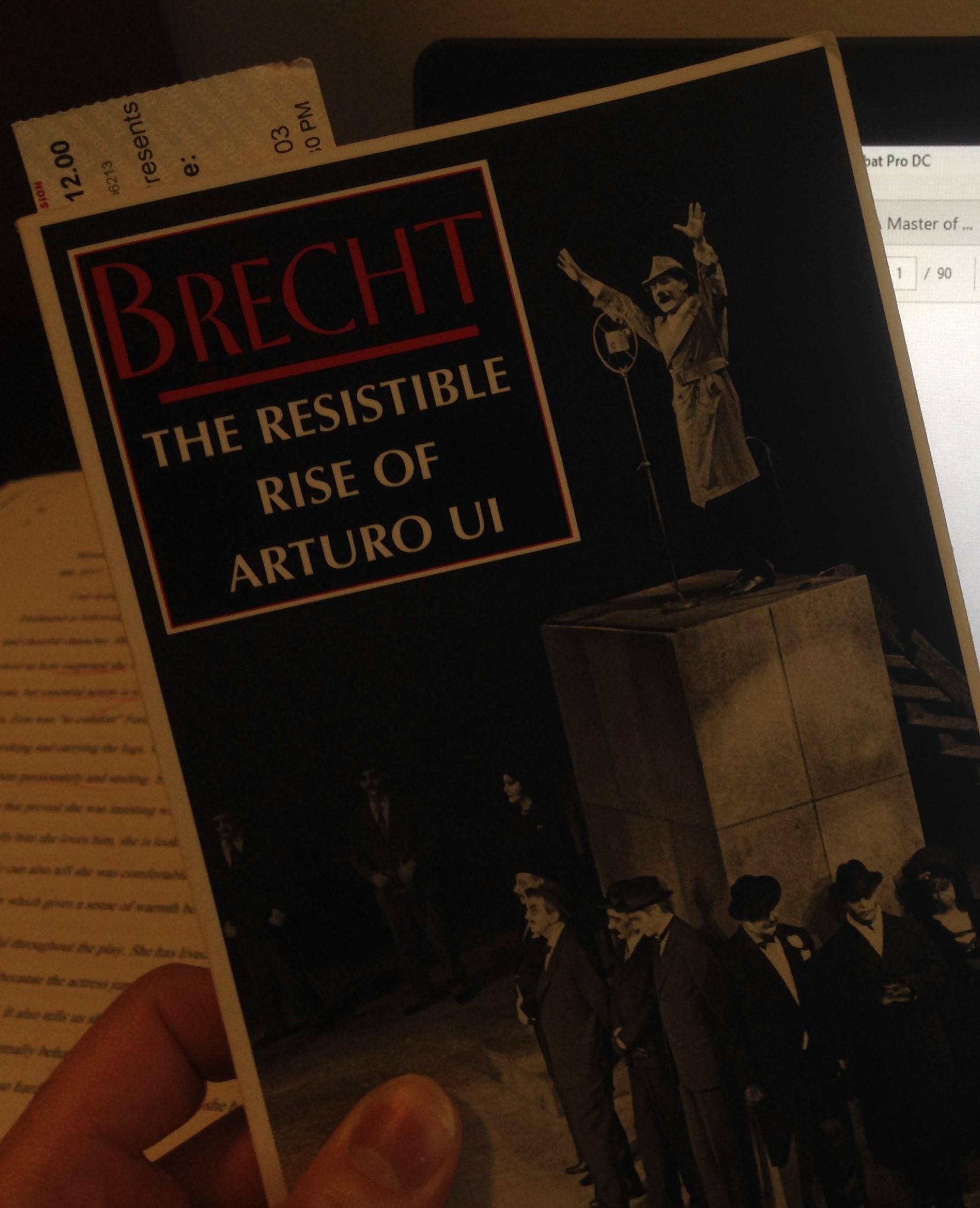Call this one the “Battle of the Same Publisher”. During the early days of this tournament, it came to my attention that the Donmar Warehouse in London was producing the world premiere of a new adaptation by playwright BRUCE NORRIS (“Clybourne Park” and many others) from a literal translation by Susan Hingley (literal translators are starting to get listed in the scripts of adaptations now, which is cool). I had to choose a translation before the Norris premiered, but I decided to add an extra bout. (Because after all, it's my blog, dammit.)
The production sold out, but my dramaturg (who just so happened to have an internship in London earlier this summer) managed to get a ticket, and she brought a copy of the script back across “the pond”. It played with a cast of 12 (same as the clown-y Chicago production of the Tabori/Beaton), including Lenny Henry as Ui and RSC veteran Michael Pennington as Dogsborough. So even though we already have the rights to the Tabori/Beaton, I decided to pick up two scripts simultaneously, one last time…
...FIGHT!
PLAY-BY-PLAY: From reviews and my dramaturg’s reports, I already knew that Norris' version was heavily about Trump. And the script reflected that, mostly in ways that I feel make the play smaller. This play is about Hitler, yes, but the fictional setting allows us a broader lens about authoritarianism in general. Making Ui call a female character a “nasty woman” or frequently complain about immigrants ties it too strongly to one person. It’s great that “They’re bringing drugs. They’re bringing crime. They’re rapists” is naturally a blank verse line with a feminine ending, but it took me out of the story too much to think about Norris’ “cleverness”. Ui’s last line is “MAKE OUR COUNTRY GREAT AGAIN”, for cryin’ out loud.
Also, the font is the same for both (being Bloomsbury Methuen Drama), and the formatting seems the same, yet Norris’ adaptation is 37 pages longer than the Tabori/Beaton. My dramaturg reported that it ran a good 2:45, and felt long to her. Norris made some cuts that Beaton didn't (Goodwill and Gaffles’ visit to Dogsborough became a quick offstage phone call), but he also added and padded certain speeches and weighed things down. Norris’ audience participation (including a pivotal silent character in a long trial scene) also struck me as gimmicky and risky. Norris moved the “Wounded Woman” monologue to an unhelpful place, and conflated it with a named character in a way that felt like a heavy-handed shot at Trump’s treatment of women. His poetry and verse was overall quite good, but didn’t land any punches on the Tabori/Beaton, and was also quite vulgar in ways that I don’t think accomplished anything. Beaton is more sparing with his profanity and slurs, which keeps the shock value from eroding through frequent use. Less is more, Bruce.
“VICTORY”: TABORI/BEATON!
I’m still glad I read the Norris, for one thing it was interesting to see a certain major character stabbed instead of shot. And the way he transitions from Mark Antony’s funeral oration into the next scene is exactly the way I was already imagining it, so I have even more confidence to fiddle with that in my own production. Norris also assigns the epilogue to the “actor playing Ui” (like Beaton), but my dramaturg remembers it spoken by the announcer.
POST-TOURNAMENT WRAP-UP:
This required a lot of rereading while double-fisting scripts, but it was quite valuable. I got a glimpse at different productions via the stage directions, and got several data points on where to place intermission. I’m confident that IU Theatre is bringing the best possible text to our audience.
Now I need to figure out the character doubling and choose scenes to use in callbacks, so I’m ready for AUDITIONS…
Thanks for reading, and thanks for supporting live theatre.
~Liam
*Fun Fact: “The Seven Year Itch” and “Arturo Ui” were among the 6 titles I pitched for my first mainstage last season, as well as “The Exonerated” which is what I ended up directing. Let’s just say I wanted to give the Play Selection Committee a diverse range of options…





